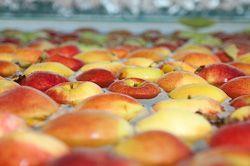
The detection of leaf litter in a consignment of New Zealand apples bound for Australia has renewed calls amongst the industry there for more stringent measures to prevent a possible fireblight incursion.
The failed inspection comes just weeks after Biosecurity Australia reopened access to the country’s markets on 17 August, following a ban New Zealand apples put in place in 1921.
A dead leaf curling midge was also found in the consignment.
The detection coming so soon after the commencement of exports to Australia is a bad look for the industry in New Zealand, which is facing intense opposition to its fruit across the Tasman.
Pipfruit New Zealand chairman Peter Beaven downplayed the incident, however, telling Radio New Zealand the detection showed the safeguards outlined in the protocol were working.
Reacting to calls from Australian growers for a greater proportion of apples to be inspected Mr Beaven said this would add to costs for New Zealand exporters and was part of a knee-jerk reaction to the detection.
Newly appointed Apple and Pear Australia Ltd (APAL) chairman John Lawrenson told the ABC, however, that the detection confirmed the organisation’s belief the protocol was not sufficient to keep diseases such as fireblight and European canker out of Australia.
While crediting the work of Australian Quarantine Inspection Services (AQIS) for making the detection, he told the news organisation it did not set a good precedent for future shipments.“This is the first week of apple exports to Australia. One consignment out of ten rejected. Pretty high rejection rate,” he said.
Meanwhile state governments in the country are defying the federal government’s decision to allow the import of New Zealand apples by instituting there own bans or restrictions.
According to agricultural publication the Land, Tasmania already has regulations in place that prohibit the import of apples from New Zealand and will investigate how the federal government’s decision to allow imports might impinge on these.
South Australia has also announced it intends to establish a ban on New Zealand apples in fruit growing regions in the state.
South Australia agriculture minister Michael O’Brien has indicated current regulations pertaining to fruit fly free designated areas in the state could be amended to exclude New Zealand apples.
New South Wales Primary Industries minister Katrina Hodgkinson said her department would also investigate what legal options it had to ban New Zealand apples from apple growing regions there.
According to the newspaper, Western Australia, which currently has restrictions on apples from the eastern states, would look at extending these to cover fruit from New Zealand also.
Besides Tasmania, these restrictions would not prevent New Zealand apples being sold in the country’s major cities.



